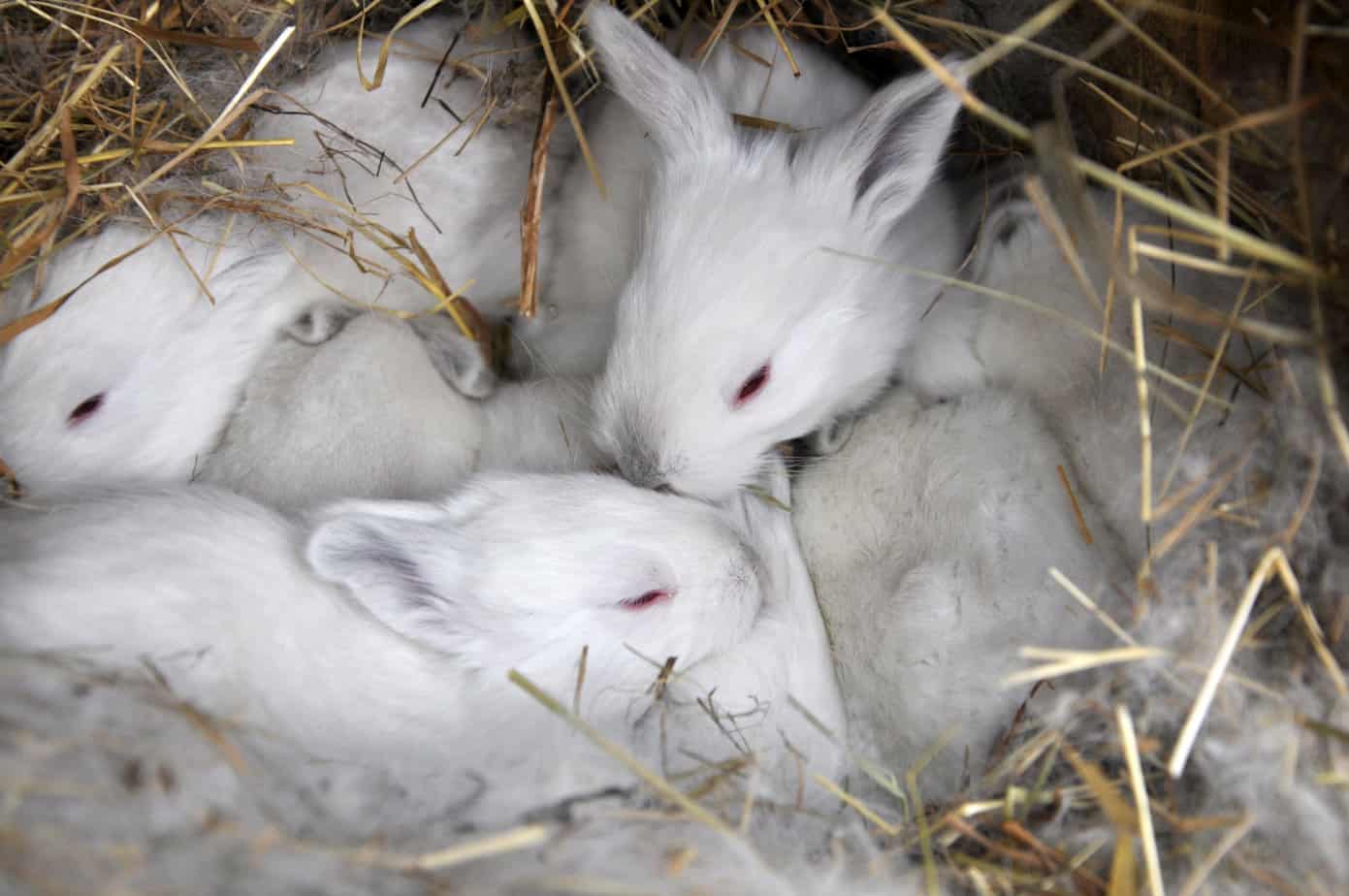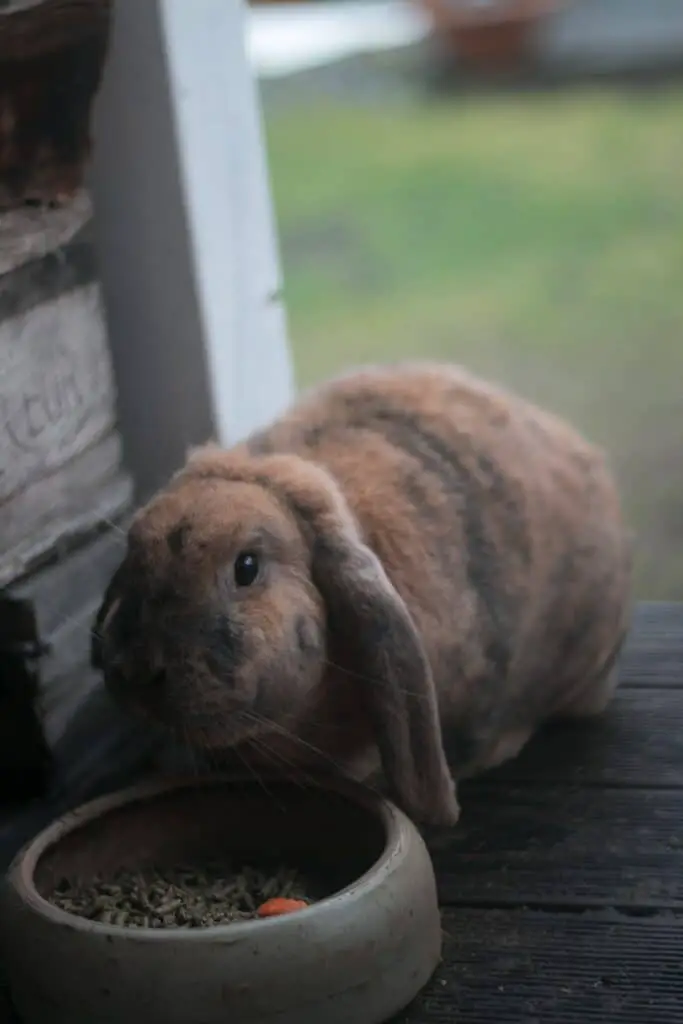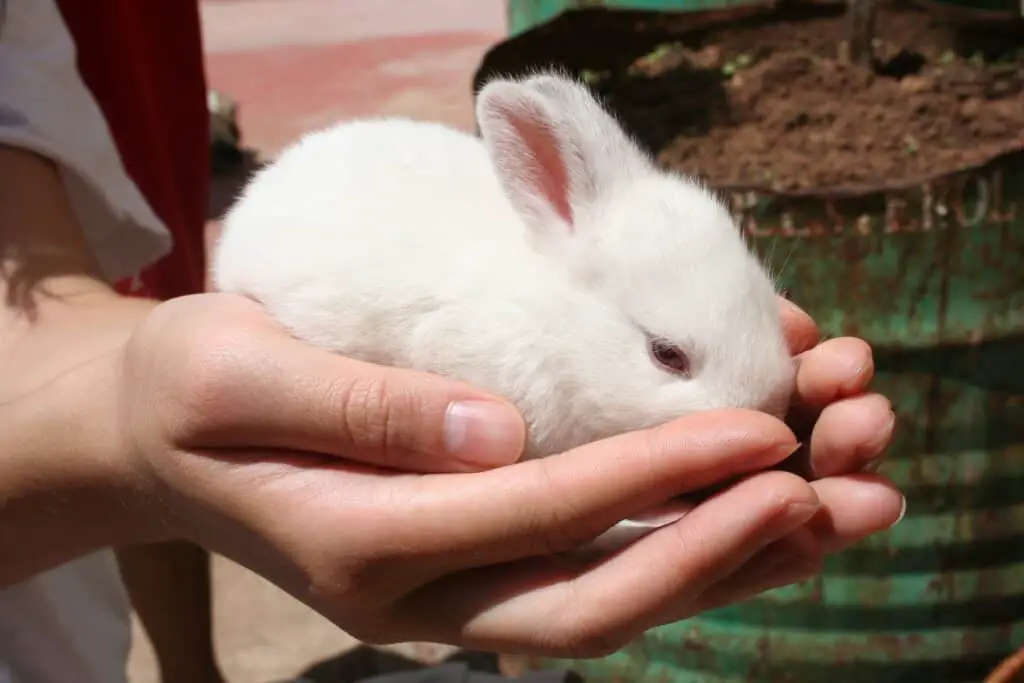
You might have been told that rabbits occasionally eat their young. This can be frightening to first-time owners and breeders, who might fear that a situation like this is inevitable. Fortunately, there are several things you can do to make sure that your new baby bunnies are safe with their mom.
Female rabbits usually do not eat their babies. Rabbits most often eat their young as a result of malnourishment, stress, or stillborn birth. Owners can prevent their rabbits from eating their offspring by avoiding early breeding, providing a well-balanced diet, and ensuring the pregnant doe is happy & calm.
While new rabbit breeders should know that a rabbit eating her young is a possibility, this behavior is something you can generally avoid if you keep a close eye on your pet rabbit. Read on to learn why your rabbits might eat their young and ways to prevent it.
Why Do Mother Rabbits Eat Their Babies?
The most likely situation in which a rabbit is likely to eat its kittens is just after a rabbit gives birth. Rabbits are vegetarians, so you might wonder why they would eat any meat at all, let alone their offspring.
Filial cannibalism occurs when an adult rabbit consumes all or part of the young and.is relatively common in many animal species, including vegetarians. However, finial cannibalism is almost always a sign that something has gone wrong or that the mother feels exceptionally stressed.
Mother rabbits most often eat their young as a result of:
1. Malnourishment
Pregnancy and birth are highly taxing for a female rabbit.
Even if you’ve been feeding your doe an adequate diet before she became pregnant, and you’ve continued this diet through the pregnancy, it might not be enough nutrition for both her and several budding fetuses.
If your mother is not properly nourished for the task of childbirth, she’ll likely finish the ordeal tired, confused, and disoriented. Survival instincts have a habit of kicking in after this traumatic event. Your doe may then eat one or several of her babies, thinking that she needs additional energy.
2. Confusion
Rabbits go through a maturation process just like human beings, not just physically but also mentally. Believe it or not, your rabbit needs to mature to an age where it is emotionally prepared to give birth.
A rabbit’s maternal instincts usually do not “kick in” before they reach six months of age, and they may not “understand” how to properly care for their kits leading to her eating her young. If your rabbit is under six months old and pregnant, you should take her to a veterinarian to ensure that she’s healthy.
Furthermore, your female rabbit can become stressed, even if she is old enough to have babies.
If a doe believes her kits are not safe in their new environment, or there is simply too much activity surrounding her, there is a possibility that she could eat her young.
3. Kits Being Mistaken For The Placenta
If you stumble upon an upsetting scene after your rabbit has given birth, don’t panic immediately! Your rabbit may be simply carrying out another natural function of childbirth.
According to this study, rabbits sometimes practice placentophagy or eating the placenta after giving birth. This is normal even in vegetarian animals, and there are health reasons for it. The placenta contains nutrients such as potassium and protein, which are critical to the health of new mothers.
So, if you see that your rabbit has simply eaten the placenta, you have nothing to worry about. Unfortunately, this behavior can sometimes lead to an unfortunate accident.
Baby rabbits are small and pink and often will come attached to one or two placentas. A rabbit will sometimes chew the placenta off and eat it, but if she’s tired, hungry, or confused, she may accidentally kill the newborn rabbit itself.
4. A Stillborn Birth
In some cases, not all of the fetuses will develop correctly, even if the mother is perfectly healthy. A mother rabbit may successfully give birth to her babies, but not all may survive.
When this happens, rabbits will likely respond by eating these stillborn babies.
This can be upsetting to discover (especially if you have children), but rabbits are only acting on instinct. Eating their stillborn offspring helps them make the most of all the energy possible and is common in the wild among many different animal species.
Remember that rabbits are operating on instinct only, and if something has gone wrong, they’re only doing what makes sense to them.
How To Prevent a Mother Rabbit From Eating Her Babies
As I mentioned previously, domesticated rabbits do not normally eat their young.
With the right knowledge and happy, healthy rabbits, you can consistently breed new litters that grow to adulthood.
If you believe you have a pregnant doe, the first thing you should do is take her to the vet. Rabbits can develop false pregnancies, so first, make sure that she is pregnant. Then ask your vet what measures you should take to keep your pet healthy.
Always trust a medical doctor’s advice before going to the Internet.
Tips to prevent mother rabbits From eating their babies include:
1. Avoid Breeding Female Rabbits too soon
Young rabbits are much more likely to eat their young than mature rabbits, so don’t try breeding your does too early. Wait for them to reach at least six months old before letting them become impregnated, and keep your female and male rabbits separate.
Once you have a healthy litter and begin to raise it, you’ll want to separate the males and females kits at eight weeks of age. Male rabbits sexually mature at ten weeks old, so you want to erase any possibility of a pregnancy before these rabbits are ready to breed.
It’s sometimes hard to tell what sex a baby rabbit is, as their genitalia is not that distinct when they’re so small.
Males have testicles that are sometimes visible, but these will often resemble a female’s anal glands. You may want to visit a vet if you’re unsure which of your baby rabbits are male and which are female.
2. Provide an Adequate Diet Your Pregnant Doe

It’s more important for pregnant rabbits to have a complete, nutritious diet in preparation for their birth. Make sure they have access to clean water at all times, refilling throughout the day.
You should feed your pregnant rabbits a complex diet of dark leafy greens, rabbit pellets, and alfalfa hay. Alfalfa is an excellent source of energy and protein, so this will make sure that your mother is strong enough to go through birth.
While an average rabbit needs only 12 to 15 percent of crude protein making up their diet, a pregnant rabbit needs 16 to 20 percent of protein. Most importantly, make sure that their protein intake is higher than usual.
If the food pellets you feed your rabbit do not provide enough protein, either switch to a brand that does or add supplements such as peanut meal or soybean meal to their meals. If your doe seems more tired than usual while pregnant, even while eating high levels of protein, take her to the vet to see if there’s anything she lacks in her diet.
3. Keep Your Pregnant Doe Happy & Calm
Owners should ensure their pregnant rabbits are happy and comfortable. Like in human pregnancies, a happy mom is much more likely to give birth to a healthy baby.
A few simple ways to keep your pregnant bunny happy include:
- Keep her on a relatively stable schedule, with meals coming at around the same time each day.
- Don’t keep her in a busy area of your home, and don’t make any loud noises in the room that she’s in.
- Ensure that she’s in a large enclosure that’s at least 3-4 times their size.
- Keep her in an area with all her favorite toys.
- Keep anyone who might be rough or intimidating away from your doe, like very young children.
- Shower her with affection, if you have an affectionate bunny, that is.
Remember that stress can endanger the health of both the mother and her babies, so she should feel safe with you and everyone else that interacts with her. If you have raucous children, you might want to keep them away from the doe during this delicate time.
Luckily, the rabbit’s gestation period is only 30-33 days long.
4. Keep a Close Eye on New Kits
The best way to make sure your baby bunnies are safe is to check on them frequently. Check in as often as you can, but no less than three times a day. If any of the kits don’t respond to your touch, remove them before the mother discovers any stillborn kittens.
Take a look at your bunnies early each morning. Mother rabbits are most active at night and will most likely feed her litter then. You should be able to tell if any of them are stillborn just by observing them for a few minutes
Baby rabbits should be warm, pink, and have little tummies. To make sure that they’re all developing correctly, weigh them each morning, ideally on a kitchen scale. Each should be gaining weight at a pace of around ¼ oz (7.08 g) per day if the mother is feeding them at night.
If any members of the litter aren’t gaining weight, the doe might not be feeding them. If this is the case, you should then separate the mother rabbit from the litter and begin feeding the babies yourself.
Feed each kitten with Kitten Milk Replacer (KMR) or goat milk. Do not give baby rabbits cow’s milk or cream, as these products don’t have the nutrients necessary for the baby bunnies to grow strong and healthy.
For a replacer designed for small pets like rabbits, one great option is the Exotic Nutrition Specialty Milk Replacer from Amazon.com. This product mimics the proteins, fats, and carbohydrates found in a rabbit mother’s milk.
Do Male Rabbits Eat Their Babies?
In rabbits, filial cannibalism is an emergency maternal response to danger, stress, or malnourishment triggered by childbirth. While this condition can rarely result in female rabbits eating their young, no such condition exists in male rabbits.
Male rabbits rarely eat their offspring. However, bucks have been known to accidentally injure or kill kittens while in play or roughhousing, usually due to a cage being too small. As a result, kittens should not live with their fathers.
In most cases, however, the mother will be watching over her litter.
If you leave the male around the doe for too long, he may try to impregnate her again. Since a female rabbit can be impregnated 24 hours after giving birth, this would not be good for the litter she already has. As a result, It’s best to keep the father away from the family unless he’s neutered.
Do Rabbits Eat Their Babies if You Touch Them?

You might have heard that rabbits will “reject” their litter if a human touches them, so you should avoid handling the babies. This rumor is common and is sometimes spread about other animals found in suburban neighborhoods, such as birds.
That actually isn’t true!
Domestic rabbits will not eat their babies if you touch them. Pet rabbits are accustomed to human scent and will likely be unconcerned with your odor on their young. Nevertheless, owners should not touch kits for an hour or so immediately after birth as mother rabbits are often protective of their kittens.
When you perceive your rabbit is in a protective mood, you should catch her in a good mood before touching them.
However, most of the time, the doe won’t have a problem with you helping care for her litter, as long as the mother knows she can trust you!
Final Thoughts
Domesticated rabbits will only eat their young if they are malnourished, if she is under stress, or if her babies were stillborn. To keep your mother rabbit from eating her young, make sure she’s getting enough protein and is mature enough to have a litter.
You shouldn’t blame your doe for this unfortunate accident.
Sometimes, even if you’re doing everything right, one of your baby bunnies won’t make it through birth or won’t make it to adulthood. All you can do is try to give them the happiest, healthiest lives possible.
